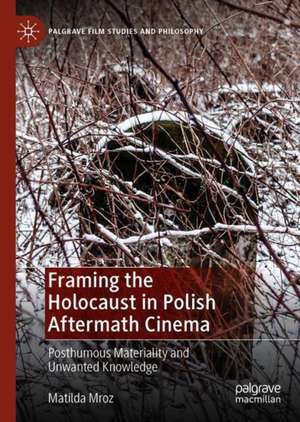Framing the Holocaust in Polish Aftermath Cinema: Posthumous Materiality and Unwanted Knowledge: Palgrave Film Studies and Philosophy
Autor Matilda Mrozen Limba Engleză Hardback – 10 feb 2021
Preț: 730.35 lei
Preț vechi: 890.66 lei
-18% Nou
Puncte Express: 1096
Preț estimativ în valută:
139.75€ • 146.28$ • 116.32£
139.75€ • 146.28$ • 116.32£
Carte tipărită la comandă
Livrare economică 31 martie-14 aprilie
Preluare comenzi: 021 569.72.76
Specificații
ISBN-13: 9781137461650
ISBN-10: 1137461659
Pagini: 256
Ilustrații: X, 298 p. 26 illus., 17 illus. in color.
Dimensiuni: 148 x 210 x 24 mm
Greutate: 0.52 kg
Ediția:1st ed. 2020
Editura: Palgrave Macmillan UK
Colecția Palgrave Macmillan
Seria Palgrave Film Studies and Philosophy
Locul publicării:London, United Kingdom
ISBN-10: 1137461659
Pagini: 256
Ilustrații: X, 298 p. 26 illus., 17 illus. in color.
Dimensiuni: 148 x 210 x 24 mm
Greutate: 0.52 kg
Ediția:1st ed. 2020
Editura: Palgrave Macmillan UK
Colecția Palgrave Macmillan
Seria Palgrave Film Studies and Philosophy
Locul publicării:London, United Kingdom
Cuprins
1. Aftermath cinema: unwanted knowledge, unwanted images.- 2. Earth and bone: framing posthumous materialities.- 3. Posthumous landscapes and the earth-archive: archaeology, ethics and Birthplace.- 4. Aftermath’s cinematic séance: anamorphosis, spectrality, and sentient matter.- 5. The fabric with its rend: framing grief, materialising loss, and Ida’s temporalities.- 6. A film found on a scrapheap: abjection, informe, and It Looks Pretty From A Distance
Notă biografică
Matilda Mroz is Lecturer in Film Studies at the University of Sydney, Australia. Prior to this she was a Senior Lecturer at the University of Sussex, a British Academy Mid-Career Fellow and Research Fellow at the University of Cambridge. She is the author of several works on cinema, including Temporality and Film Analysis (2012).
Caracteristici
Provides an innovative account of how Polish cinema is responding to new histories of the Holocaust, as Polish perpetration, bystanding and witnessing in rural and provincial spaces is being reconceived. Conducts original close readings of key Polish films via theoretical and film-philosophical frameworks to reconsider ethical and epistemological questions arising from film form, narrative and genre. Forges a new approach to a ‘posthumous ecology’, interconnecting the material remains of Jewish victims, the natural environment, archaeological processes of exhumation, and their aesthetic rendering through cinema.



